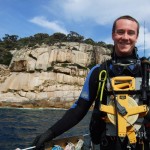
Cayne Layton
Marine Ecologist
Institute for Marine and Antarctic Studies
I first developed my passion for marine science as a young child while scrambling around rockpools and beaches. I remember bringing home all sorts of crab claws, shells, shark eggs and fish skeletons (much to my parents’ delight!).
I started a science degree after college because there was so much about the natural world that I still wanted to learn. I majored in zoology and ecology at the Australian National University in Canberra and, after learning to SCUBA dive in my final year, completed my Honours degree studying coral reef fish on a remote tropical island in the Great Barrier Reef. After graduating I continued to work as a research assistant in the same lab and although I loved working in tropical waters, my true passion had always been for the colder temperate waters of Southern Australia where I grew up swimming and exploring.
I moved to Tasmania to study at the well-known Institute for Marine and Antarctic Studies and also for Tasmania’s amazing marine environment. Southern Australia – and Tasmania especially – has some of the most colourful, biodiverse and unique underwater environments on the planet. Tasmania’s reefs don’t have the corals of tropical Australia, instead they’re dominated by large seaweeds called kelp, and it’s these that I study as part of my PhD project.
Kelp form vast underwater forests, some as high as a six-storey building, and they act just like the forests on land; providing homes, food and shelter for a whole ecosystem of animals and other organisms. My research involves diving in these kelp forests and examining how the forests support themselves and the next generation of kelp ‘seedlings’. Sadly, kelp forests are under threat from climate change and invasive sea urchins and so it’s incredibly important to understand how they function. Particularly considering that kelp forests are the foundation of not only our unique marine environment but also the important abalone and rock lobster fisheries.
Studying science has allowed me to travel and work in some fantastic places. I’m incredibly lucky to be able to spend my life doing what I love and swimming around for endless hours in an underwater forest.
For more information: www.imas.utas.edu.au